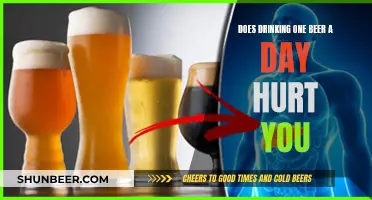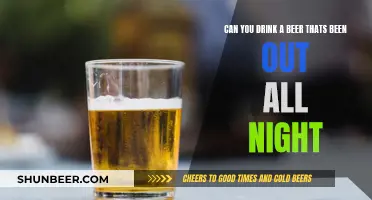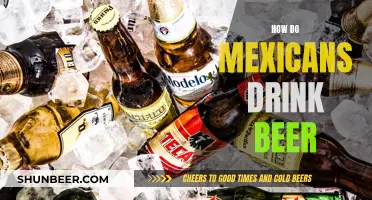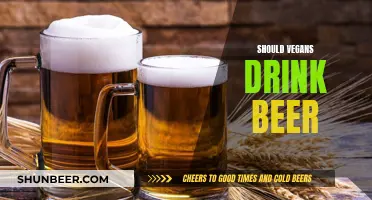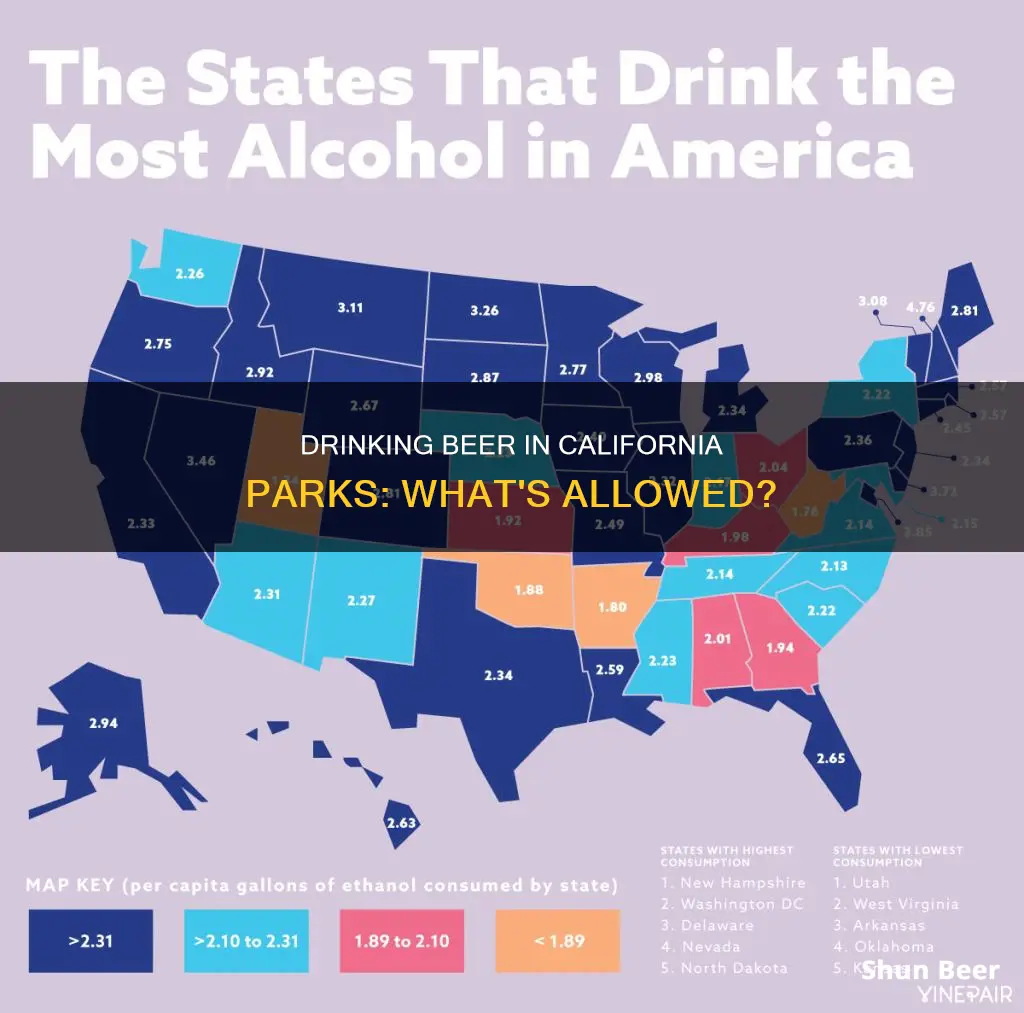
Drinking in public spaces, including parks, is generally illegal in California. State law prohibits the consumption of alcohol in any recreational or park district outside of licensed venues such as bars and restaurants. However, there are exceptions and variations to these rules. For instance, some parks in the Bay Area, such as Golden Gate Park and Lake Temescal, permit alcohol consumption in certain designated areas, as long as it is not hard liquor or served in glass containers or kegs. Additionally, overnight campers in California State Park Recreation Areas are allowed to consume alcohol, but it is prohibited in all day-use areas. While law enforcement officers may be lenient towards public drinking in certain areas, it is important to be aware of and comply with local regulations to avoid citations or legal consequences.
| Characteristics | Values |
|---|---|
| Drinking in public in California | Illegal |
| Drinking in parks in California | Illegal |
| Exceptions | Drinking is allowed in some parks, such as Golden Gate Park, Lake Temescal, and Sonoma Plaza Park. Drinking is also allowed in some areas of Golden Gate National Recreation Area. |
| Open containers in public | Illegal |
| Exceptions to open container laws | Licensed areas, recycling |
| Drinking in front yards | Allowed, as long as it is on private property |
| Drinking on sidewalks | Illegal |
What You'll Learn
- Drinking in parks is generally illegal in California
- Drinking in public is a form of disorderly conduct
- There are exceptions to the law, such as licensed areas or events
- Public intoxication is a misdemeanor and can result in a permanent criminal record
- Specific parks may have designated areas where alcohol is allowed

Drinking in parks is generally illegal in California
California's open container law, BPC 25620, states that it is an infraction for any individual to possess or consume an open alcohol container in any public place. This includes any city or county park, public recreation or open-space district, and streets or sidewalks. The law defines an open container as any can, bottle, or receptacle that has been opened, had its seal broken, or had its contents partially removed. Violating this law is considered an infraction and typically results in a ticket and a fine rather than jail time.
There are a few exceptions to the open container laws. Alcohol possession and consumption are allowed in licensed venues, such as bars, restaurants, or taverns. Additionally, alcohol may be permitted in designated entertainment zones within local cities or counties if Senate Bill 969 passes. Currently, some parks in the Bay Area, such as Golden Gate Park and Lake Temescal, allow alcohol consumption in certain picnic areas, as long as it is not hard liquor or served in glass containers or kegs. Similarly, Sonoma Plaza Park allows drinking until dark, with no restrictions on the type of alcohol.
It is important to note that local ordinances and specific park regulations can impose stricter rules or penalties for public drinking. For example, while alcohol may be allowed in some California state parks for overnight camping, it is generally prohibited in day-use areas. Therefore, it is crucial to check the regulations of the specific park or area before consuming alcohol.
In addition to open container laws, public intoxication is also illegal in California. Under California Penal Code 647(f), it is a misdemeanor to be drunk in public, which includes being unable to care for oneself or others or preventing the free use of public spaces. This offense can result in up to six months in county jail, fines, or both.
Beer and Flu Medication: A Safe Mix?
You may want to see also

Drinking in public is a form of disorderly conduct
Drinking in public is considered disorderly conduct in California. It is generally illegal to drink in public in California outside of a licensed venue such as a bar, restaurant, or tavern. State and local laws prohibit possessing an open container of alcohol in public and make it a misdemeanor for a minor to possess alcohol in public. Being intoxicated to the point of being unable to care for oneself or others is also a misdemeanor.
California state law prohibits drinking alcohol in recreation or park districts and open-space districts. This includes any receptacle containing alcohol that has had its seal broken or been partially depleted. Violating this law is considered an infraction and results in a ticket rather than jail time. However, there are exceptions for areas with a license for alcohol and for recycling purposes.
Public drinking is almost universally condemned or outlawed in some countries and states in the United States, while it is more socially acceptable in other countries and states. Opponents of public drinking argue that it encourages overconsumption, rowdiness, and violence, while proponents argue that it does not cause these issues and that it helps normalize a healthier drinking culture.
Public intoxication, also known as "drunk and disorderly" or "drunk in public," is considered a summary offense in some countries and jurisdictions. These laws typically require an obvious display of intoxicated incompetence or behavior that disrupts public order before a charge is levied. The penalties for public intoxication vary depending on the jurisdiction, but they can include fines, jail time, probation, or community service.
In California, public intoxication is considered a misdemeanor under the California Penal Code 647(f). The code describes public intoxication as someone who is unable to care for themselves or others or interferes with the free use of streets, sidewalks, or other public ways due to intoxication from liquor, drugs, or controlled substances. The penalties for a drunk in public charge in California include up to six months in county jail and/or summary probation for a first offense.
Heart Monitor and Beer: Is It Safe?
You may want to see also

There are exceptions to the law, such as licensed areas or events
Drinking in public spaces, including parks, is generally illegal in California. However, there are some exceptions to this rule.
Firstly, licensed areas or events are allowed to serve alcohol. This means that certain parks can obtain a license to allow alcohol consumption within designated areas. For example, some parks in the Bay Area, such as Golden Gate Park in San Francisco, Lake Temescal in Oakland, and Sonoma Plaza Park in Sonoma, have specific picnic areas where alcohol consumption is permitted. These licensed areas usually prohibit hard liquor, glass containers, and kegs, but allow wine and beer.
Secondly, alcohol consumption is permitted in certain overnight camp sites within California State Parks. For instance, at Lake Perris State Recreation Area, alcohol is prohibited in all day-use areas but is allowed within overnight camp sites and vessels.
It is important to note that local ordinances and regulations can vary, so it is always a good idea to check the specific rules for the park or area you plan to visit. Additionally, while law enforcement officers may be lenient towards public drinking in certain areas, it is still illegal, and you may be cited or taken to jail if caught.
Enjoying Beer at Camp Nou: What's the Deal?
You may want to see also

Public intoxication is a misdemeanor and can result in a permanent criminal record
Drinking in public spaces, such as parks, is generally illegal in California. State laws prohibit the possession and consumption of alcoholic beverages in designated day-use areas, including recreation and park districts. Violating these laws can result in a fine or, in some cases, jail time.
Public intoxication, also known as "drunk in public," is specifically addressed under California Penal Code Section 647(f). It is considered a misdemeanor and is punishable by up to six months in county jail and/or a fine of up to $1,000. To be convicted under this statute, the prosecution must prove beyond a reasonable doubt that the individual was:
- Willfully under the influence of alcohol, drugs, or a controlled substance.
- In a public place while under the influence.
- Unable to exercise care for their own safety or the safety of others.
- Interfering with, obstructing, or preventing the free use of any street, sidewalk, or other public way.
The term "willfully" implies that the intoxication was deliberate or voluntary. A controlled substance includes any drug regulated by the government, such as cocaine, methamphetamine, marijuana, or prescription medications.
A public place, in this context, refers to any location that is readily accessible to the public, including sidewalks, streets, parks, and even homeless encampments.
The consequences of a public intoxication conviction can extend beyond the legal penalties. Having a criminal record, even for a minor misdemeanor, can impact various aspects of one's life, including employment opportunities, housing, immigration status, licensing, and more. Therefore, it is advisable to seek legal counsel and explore possible defenses or alternatives to mitigate the potential long-term effects of a conviction.
Drinking Beer on Boats: Texas Laws Explained
You may want to see also

Specific parks may have designated areas where alcohol is allowed
Drinking in public spaces in California is generally prohibited. State laws forbid the possession of open containers of alcohol in public spaces, including parks. However, specific parks in California may have designated areas where alcohol consumption is allowed. These parks usually have specific rules and regulations that permit drinking in certain areas or under certain conditions.
For example, in the Bay Area, Golden Gate Park in San Francisco has several picnic areas designated as alcohol-friendly, such as Horseshoe Courts Picnic Area, Bunny Meadow, and Chinese Pavilion at Stow Lake. Similarly, Lake Temescal in Oakland allows wine and beer consumption, while hard alcohol is prohibited. Sonoma Plaza Park in Sonoma is one of the few parks that permit the consumption of any alcoholic beverage, including hard liquor.
In San Jose, many regional parks, such as Kelley Park, Alum Rock Park, and Almaden Lake Park, also allow alcohol consumption at their picnic sites. The Golden Gate National Recreation Area, controlled by the U.S. National Park Service, permits drinking in most of its parks, with a few exceptions like Ocean Beach, Alcatraz, and Sutro Baths.
It is important to note that while these parks allow alcohol consumption, there are still rules and restrictions in place. Glass containers, hard liquor, and kegs are typically prohibited. Additionally, public intoxication and disorderly conduct are considered misdemeanors and can result in legal consequences.
Before consuming alcohol in any park, it is essential to check the local regulations and rules specific to that park to ensure compliance with the law.
Beer Tower Tech: Glycol Cooling Explained
You may want to see also



